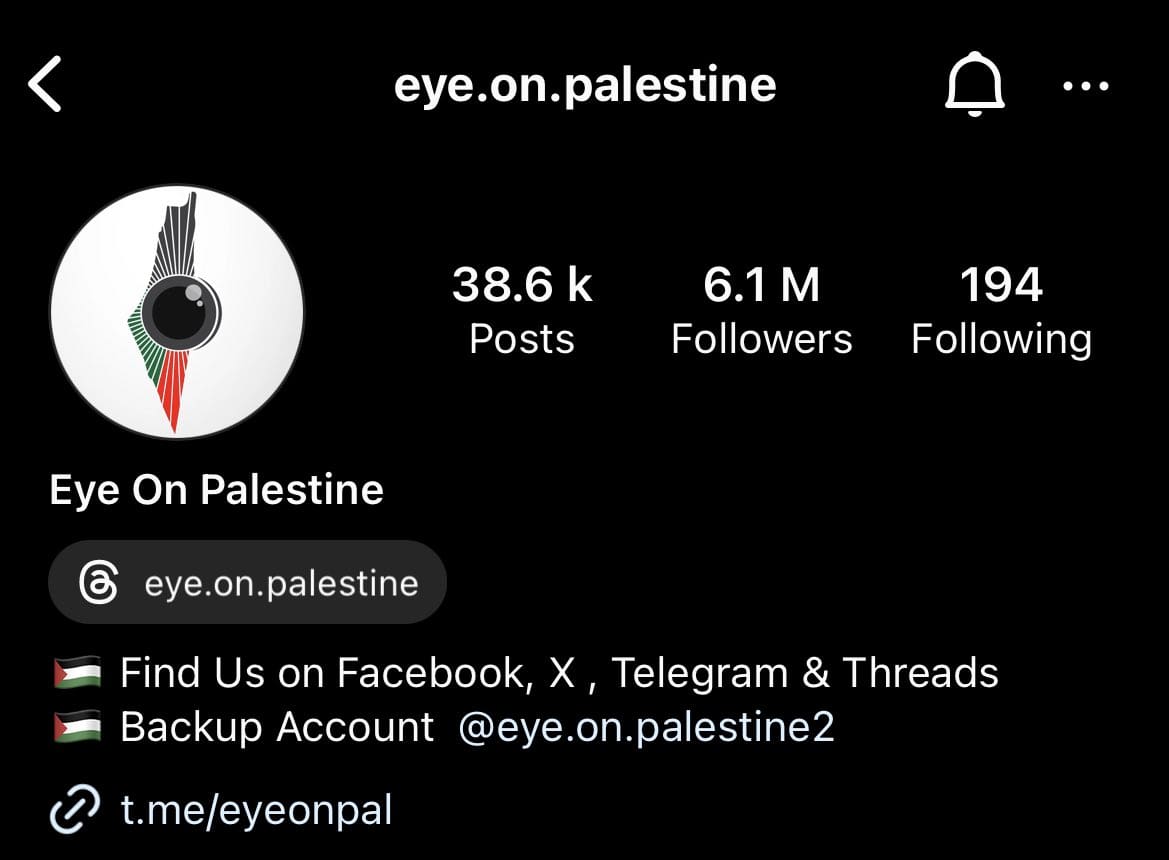While the blocking of Eye on Palestine may seem like a single event, it rather falls under a wider pattern of misinformation waged by Israel and its western allies.
Meta and X blocked prominent Palestinian news page ‘Eye on Palestine’ on Wednesday in a move that has been widely described as another attempt to suppress the Palestinian narrative in light of the Israeli aggression on Gaza.
Eye on Palestine is the largest Palestinian social media account with more than six million followers on Instagram alone and has continuously exposed Israel’s ongoing crimes against Palestinians, especially the latest war on Gaza.
Followers of the account who have been eager to stay up-to-date with the ongoing Israeli massacres noticed the account was removed on both Instagram and X.
Meta said that it blocked the account due to “security concerns.”
“These accounts were initially locked for security reasons after signs of compromise, and we’re working to make contact with the account owners to ensure they have access,” Meta spokesperson Andy Stone said in a statement.
Stone maintained that Meta “did not disable these accounts because of any content they were sharing.”
The move was met with major outrage, with many calling out the social media giants for their censorship of Palestinian voices.
“Hey Adam, we need the world to see the atrocity that is happening. Please give us back Eye on Palestine. I understand you are Israeli but you are also human,” a social media user said, referring to Adam Mosseri, the head of Instagram.
Another said: “IG just removed the largest account showing the reality on the ground in Gaza. The account was Eye.on.Palestine. This is egregious censorship! Fascism!”
Dr. Omar Suleiman, the Founder and President of the Yaqeen Institute for Islamic Research, also called on Meta to “stop silencing Palestinian voices.”
“Meta censorship of Palestinian voices has been damning and damaging. Eye on Palestine had over 6 million Instagram followers. Call for Meta to reinstate this account now and stop silencing Palestinian voices,” he said in a post on X, formerly known as Twitter.
Last week, Meta acknowledged an alleged “bug” on Instagram that impacted the visibility of users’ stories after users accused the platform of targeting Palestinian content by “shadow-banning” those who share such narratives.
Meta Spokesman Andy Stone claimed the glitch “affected accounts equally around the globe” and had no connection to the content’s subject matter being shared.
“We identified a bug impacting all Stories that re-shared Reels and Feed posts, meaning they weren’t showing up properly in people’s Stories tray, leading to significantly reduced reach,” Stone wrote in a post on X on 15 October.
However, the Hampton Institute, a think tank that speaks on pressing global social issues, stated that social media platforms are actively blocking posts about the reality of the “factual” history of Israel and Palestine.
Wider pattern of censorship
While the blocking of Eye on Palestine may seem like a single event, it falls in line with a wider pattern of misinformation waged by Israel and its western allies in an attempt to suppress the Palestinian narrative.
Last year, Meta-owned WhatsApp banned numerous Palestinian accounts from the platform. WhatsApp’s co-founder also donated $2 million to the United Democracy Project (Political Action Committee) that promotes candidates “that support the US’ partnership with Israel“.
Meanwhile last month, Meta deleted the account of Al Jazeera presenter Tamer Almisshal less than 24 hours after an expose that unveiled the social media giant’s censorship of Palestinian content.
X had also assembled on 7 October to remove “illegal content” and accounts linked to Palestinian resistance movement Hamas, designated by the United States as a terrorist organisation.
However, the social media platforms have turned a blind eye to the hate speech and misinformation aimed at Palestinians.
The Arab Center for the Development of Social Media (7amleh) documented between 7-12 October more than 19,000 cases of hate speech and incitement using the Hebrew language on X, formerly known as Twitter. The watchdog noted that the increase of such content started on 7 October, the first day of the escalations.
At least 30% of the hate content documented by 7amleh included fake news or the promotion of violence or incitement.
“The Israeli government is taking advantage of the current international sentiment to continue exerting pressure on social media companies to censor the Palestinian narrative and silence voices critical of Israeli policies,” 7amleh said at the time.
The Israeli government also launched a propaganda campaign to garner the sympathy of the west in yet another attempt to manipulate public opinion towards its crimes against Palestinians in Gaza.
The campaign, seen on X and YouTube, involves the dissemination of emotionally charged and graphic advertisements, according to a data analysis carried out by Politico. Journalist Sophia Smith, in a thread on X last week, noted that the Israeli government spent close to $7.1 million solely on YouTube ads.
Meanwhile, Al Jazeera has been among a list of targets by Israel, subjecting the network and its journalists to various deliberate attacks for its detailed and impartial coverage of the violence committed by the Israeli occupation forces (IOF) against Palestinians.
Unlike other renowned media outlets that have been accused of parroting the Israeli narrative, Al Jazeera explicitly details the suffering of millions of Palestinians through its reporters and journalists on the ground.
Last week, Middle East Eye cited Israeli media on an alleged approval of Israel’s attorney general’s request to shut down the Qatar-based broadcaster.
The reports said that attorney general Gali Baharav-Miara and Communications Minister Shlomo Karhi had reached an agreement on the wording of “emergency regulations” that would ban the Qatari outlet’s operations.
A separate report pointed to an emergency Israeli cabinet meeting on the matter in which Karhi sought to approve the closure of Al Jazeera’s coverage in Israel. Reports at the time suggested that Israeli security officials had vetted the proposal.
The Qatari-based Al Jazeera network has yet to comment on the matter.







